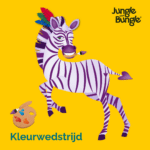Benefits of bilingual parenting
Children brought up bilingual from birth can learn both languages up to the native language level. On top of this, children raised bilingually have been found to be better at multitasking, better at ignoring information that does not matter, and on average are better with their cognitive skills than their peers who speak only one language.
Easier to learn a third language
Being bilingual makes it easier to learn other languages, as you are accustomed to the learning mechanisms and familiar with the intricacies of learning a language. Moreover, memory processes and the association of language concepts are highly developed, which contributes to the ease of learning a third language.
Future of bilingual parenting
One of the biggest advantages of bilingual education, is the fact that children's career opportunities are enhanced. Speaking two or more languages will always be an advantage over any other professional who speaks only one language, especially if you want to work for international companies. On top of this, it also increases the chances of finding work, as you can start working for Dutch-speaking companies as well as English or Spanish-speaking companies, for example.
Bilingual parenting for other countries
Whether it is because you are moving to another country or because you just like to surround yourself with other cultures, being bilingual will allow you to form friendships with a large group of international people. Speaking a majority language, such as English, will also make your adjustment to life in other countries easier.
Tips for bilingual parenting
Regardless of the strategy you choose, these are some of our tips that will make bilingual parenting somewhat easier. Our first tip is to decide whether bilingual parenting is the right option for your family. It is something that requires a lot of effort and dedication, so the commitment has to be total. If you go for it then you have to go all the way!
Bilingual parenting learning by speaking
The most common strategy of bilingual parenting is when one parent speaks one language to the child (e.g. Dutch) and the other parent always speaks in the second language to the child (e.g. English). If you find this too much, you could also choose to speak the second language on weekends, for example, to practise it. However, the more you practice it, the faster and better the child will master both languages.
Bilingual parenting by content
Books, films, series, songs? children love them! So introduce them to a new language in a playful way. One of our recommendations is to let children increase their vocabulary through entertainment. Anno 2021, there are many series, films and books that can help your children with the language. Our books ?The Adventure of Gravity? & ?Food Feast', for example, can be very helpful here.
Enlist a babysitter who is bilingual
If you regularly have a babysitter on the floor, we recommend you hire one who speaks both languages. This way, even when you are not there, your children can develop their languages. For example, the babysitter can help the children with their speaking skills while playing, doing crafts or cooking. No idea where to hire a multilingual babysitter? Many online babysitting platforms have thousands of babysitters who speak several languages and can watch your child and/or help them with their homework. An example of such an online babysitting platform is Babysits. Here, you can even hire someone from the other side of the world to brush up on your child's language skills online.
This article was written in collaboration with Babysits, the Netherlands' leading online babysitting platform. Are you looking for a reliable babysitter who, besides babysitting your little one, can also help with second or third language development? Then Babysits is the right place for you! Check out www.babysits.nl for more information.








